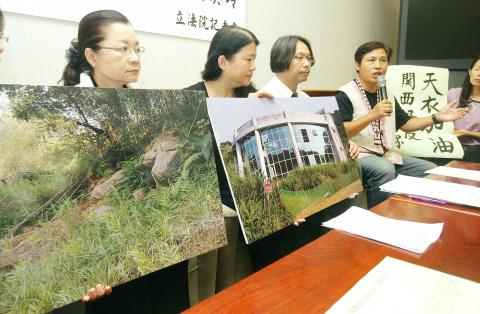Aboriginal rights activists yesterday protested a slander suit filed against them by a developer after they exposed what they said was the illegal construction of a building on Aboriginal reserve land in Hsinchu County.
“This is ridiculous, that someone who is destroying our land files a lawsuit against us,” Liu Mei-ling (劉美玲), an Atayal from Hsinchu County’s Guansi Township (關西), told a news conference at the Legislative Yuan.
“We have done nothing wrong in defending our home,” he added.

Photo: CNA
Liu, along with non-Aboriginal writer Chu Tien-i (朱天衣), were sued by a man surnamed Hsu (許), who last year started constructing a farmhouse on a plot of Atayal reserve land in Hsinchu, which is also restricted forestry land according to the Forestry Bureau.
Since last year, Liu and Chu, with the help of environmentalists and Aboriginal rights advocates, have questioned the legality of the construction since non-Aborigines are not permitted to make use of Aboriginal reserve land, not to mention that the land is also a natural reserve.
Following their protests, the Hsinchu County Government revoked the construction permit for Hsu’s house in April and said that if Hsu wants to reapply for a construction permit, he must first obtain permission from both the Forestry Bureau and the Council of Indigenous Peoples.
“If the government had done its job right, we wouldn’t have to stand up against such things,” Chu said.
“I’ve lived in Guansi for more than 10 years. I’ve seen too many cases of illegal development projects and construction causing damage not only to the ecosystem, but also to the mountains,” he added.
“I feel obliged to stand up against such things,” Chu said.
Omi Wilang, convener of the Indigenous Peoples’ Action Coalition Taiwan, who is also an Atayal, said that in Aboriginal communities nationwide, there are non-Aboriginal developers who borrow Aborigines’ names through deception or other means so that they may obtain the de facto right to use Aboriginal reserve land.
“What happens in Mautu is not an isolated case,” Omi added, referring to the site in Guansi by its Atayal name.
“It’s not a big deal that I’m being sued, but the question is how long do we have to wait for the government to take action to protect Aboriginal reserve lands?” Chu said. “If the county government has revoked Hsu’s construction permit, why is it allowing him to apply again if he gets permission from the Forestry Bureau and the Council of Indigenous Peoples?”
Various environmental protection groups also voiced their support for Liu and Chu.
Lin San-chia (林三加), a lawyer representing the two men, said the Constitution protects people’s right to report alleged illegal matters for the reason of encouraging citizens to care about public issues, but it will boomerang if groups are sued when they exercise their rights.
Lin urged the government’s Soil and Water Conservation Bureau and the agencies that manage Aboriginal affairs to explain how the developer got his construction permit, despite the area being a hillside conservation zone limited to forestry and reserved for Aborigines.

A Taiwanese software developer has created a generative artificial intelligence (AI) model to help people use AI without exposing sensitive data, project head Huang Chung-hsiao (黃崇校) said yesterday. Huang, a 55-year-old coder leading a US-based team, said that concerns over data privacy and security in popular generative AIs such as ChatGPT and DeepSeek motivated him to develop a personal AI assistant named “Mei.” One of the biggest security flaws with cloud-based algorithms is that users are required to hand over personal information to access the service, giving developers the opportunity to mine user data, he said. For this reason, many government agencies and

The National Fire Agency on Thursday said a series of drills simulating a magnitude 8.5 earthquake would be held in September to enhance the government’s emergency response capabilities. Since earthquakes cannot be predicted, only by continuously promoting disaster prevention measures could Taiwan enhance its resilience to earthquakes, agency Director-General Hsiao Huan-chang (蕭煥章) said in a news release. The exercises would be held to mark annual National Disaster Prevention Day on Sept. 21, the aim of which is to test Taiwan’s preparedness and improve its earthquake resilience in case of a major temblor, Hsiao said. As part of those drills, an earthquake alert would

DEFENSE: The National Security Bureau promised to expand communication and intelligence cooperation with global partners and enhance its strategic analytical skills China has not only increased military exercises and “gray zone” tactics against Taiwan this year, but also continues to recruit military personnel for espionage, the National Security Bureau (NSB) said yesterday in a report to the Legislative Yuan. The bureau submitted the report ahead of NSB Director-General Tsai Ming-yen’s (蔡明彥) appearance before the Foreign and National Defense Committee today. Last year, the Chinese People’s Liberation Army (PLA) conducted “Joint Sword-2024A and B” military exercises targeting Taiwan and carried out 40 combat readiness patrols, the bureau said. In addition, Chinese military aircraft entered Taiwan’s airspace 3,070 times last year, up about

STRICTER ENFORCEMENT: Taipei authorities warned against drunk cycling after a sharp rise in riding under the influence, urging greater public awareness of its illegality Taipei authorities have issued a public warning urging people not to ride bicycles after consuming alcohol, following a sharp rise in riding under the influence (DUI) cases involving bicycles. Five hundred and seven people were charged with DUI last year while riding YouBikes, personal bicycles, or other self-propelled two-wheelers — a fourfold increase from the previous year, data released by the Taipei Police Department’s Traffic Division showed. Of these, 33 cases were considered severe enough to be prosecuted under “offenses against public safety,” the data showed. Under the Road Traffic Management and Penalty Act (道路交通管理處罰條例), bicycles — including YouBikes and other